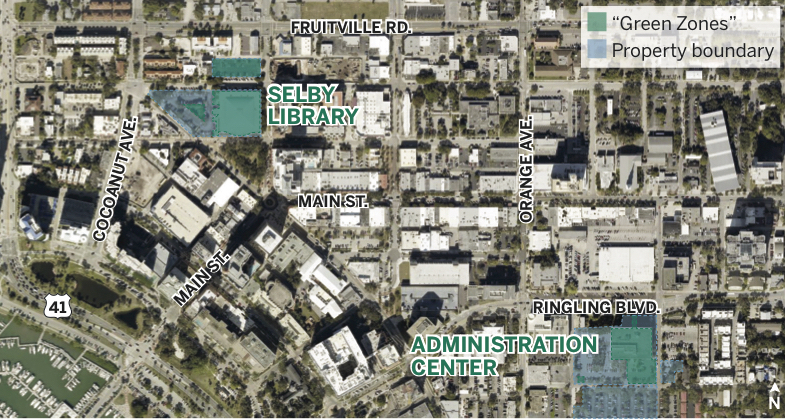- April 18, 2024
-
-
Loading

Loading

On July 1, Sarasota resident Richard Ramsdell emailed City Commissioner Liz Alpert a photograph of an assemblage of bags containing unattended possessions near the bike racks at the Selby Library.
Ramsdell was one of many residents this month to reach out to city officials with a complaint: Why wasn’t the city more proactively managing the situation at the downtown library?
“It amazes me that Sarasota can be voted the ‘meanest city in America’ for its treatment of the homeless and then be so frightened by it that for ten years we do nothing,” Ramsdell wrote.
The Selby Library is the latest in a series of public properties to generate complaints due to the gathering of homeless individuals and associated behaviors. Although the city is now confident in its ability to enforce ordinances prohibiting lodging outdoors and the storage of unattended material, Selby Library poses a unique challenge for city officials.
That’s because Sarasota County owns and operates the Selby Library. Although city and county staff members are coordinating on homelessness issues, this split jurisdiction highlights differences in how the two governments believe the issue can be addressed. It also showcases the divide over the need for a come-as-you-are shelter and jail diversion program — a facility the county believes is essential, but which the city ceased its support for in 2014.
“The fact that people are homeless and at county properties — they’re afforded every constitutional right that a person with a home is.” — Wayne Applebee
On July 10, County Administrator Tom Harmer issued a directive defining “prohibited conduct” on county owned and managed properties. That list prohibits remaining on certain portions of the property after the posted hours of operation and unauthorized storage of personal property.
Wayne Applebee, the county’s director of homeless services, said regulations must specifically combat behavior, rather than targeting a specific subgroup.
“We can’t stand in the doorway and say, ‘Do you live in a house? Do you not live in a house?’” Applebee said. “The fact that people are homeless and at county properties — they’re afforded every constitutional right that a person with a home is.”
City Manager Tom Barwin expects the changes will reduce unattended property and the visible homeless population at the library. Still, at both the library and County Administration Building, parts of the property aren’t off-limits after hours. The new regulations prohibit remaining in a building and “its attached covered areas, doorways, walkways, ramps or steps” beyond the posted hours of operation.
The rest of the property doesn’t have the same prohibition, a distinction that can be tied to the 1998 Pottinger settlement between the city of Miami and the Miami chapter of the Florida American Civil Liberties Union.

City Attorney Robert Fournier said the county is concerned about the ability to enforce the city ordinances, because the Pottinger agreement requires the availability of an alternate shelter to enforce laws that would restrict certain life-sustaining behavior, such as lodging outdoors.
“They don’t believe we can enforce our ordinances, because we’re not Pottinger compliant because we don’t have a come-as-you-are shelter,” Fournier said. “Which I think is ridiculous.”
Fournier said the city only enforces certain ordinances when individuals are offered shelter at the Salvation Army. He said the county believes a shelter must meet certain specifications that the Salvation Army does not satisfy — specifications that Fournier said aren’t actually outlined in the Pottinger settlement.
The county attorney’s office did not respond to several requests for comment. Applebee indicated that the county believes a come-as-you-are shelter is necessary to more vigorously enforce the ordinances in question.
“The fact that they’re homeless is not a crime,” Applebee said. “They have a right to be places with their stuff — until we create that alternative that our board of county commissioners has been supportive of.”
“The problem is self-created by the county, if you ask me.” — Robert Fournier
Fournier remains confident that the city is properly enforcing its laws. He said the county is welcome to do the same on properties within the city.
“The problem is self-created by the county, if you ask me,” Fournier said
As long as the region lacks a shelter, the county disagrees with the city attorney’s assessment of the situation. As a result, the three-year dispute over a come-as-you-are shelter is likely to persist, even if the homeless population at Selby Library disperses.
“Without a place to take them that is legally compliant with the court, we can’t force them to go anywhere,” Applebee said said. “We’ll continue our outreach on a steady, regular basis but recognize not everybody will voluntarily take it.”